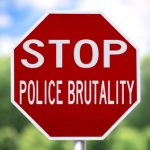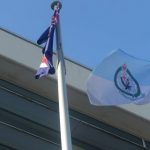Fighting Police Corruption: An Interview With Justice Advocate Renee Eaves

The Fitzgerald Inquiry into Queensland police corruption was sparked by media reports linking police officers to illegal activities. Tabling its report in 1989, the inquiry’s findings led to an overhaul of policing practices and the prosecution a former police commissioner and four ministers.
Key recommendations made by the inquiry were that an independent oversight body be established, and freedom of information laws be enacted.
However, two decades on, Renee Eaves describes the culture within the Queensland Police Service (QPS) as worse than that of the pre-Fitzgerald era. Indeed, after years of fighting for greater police transparency, the social justice advocate is well-aware of the levels of corruption that still prevail.
Calling for greater oversight
Today, the Crime and Corruption Commission (CCC) is the oversight body that deals with police corruption in Queensland. Its origins can be traced back to the inquiry. But, Ms Eaves makes clear that the CCC is an ineffective body, and she questions its independence.
And while right to information (RTI) laws – another legacy of the inquiry – served Ms Eaves well, in that they allowed her to ascertain that police officers had illegally accessed her file upwards of 1,400 times, she explains that this access to information has since been stymied.
In the face of this broken system, Ms Eaves and a number of other leading advocates have just launched the Queensland Police Accountability Taskforce: a committee highlighting the inadequate oversight of police corruption and misconduct.
Punishing the whistleblower
Just one example of QPS corruption is an incident involving the Surfers Paradise patrol unit known as Team Two. These notorious officers had 21 excessive force complaints levelled against them, prior to the release of footage showing a group of them assaulting 22-year-old Noa Begic.
The only officer charged in relation to the incident was a man who had nothing to do with the bashing. Former Gold Coast Police Sergeant Rick Flori – who leaked the footage to the media and exposed the crime – was stood down and charged with the offence of misconduct in public office.
After a six year battle to clear his name, Mr Flori was found not guilty of the offence last February. Ms Eaves was instrumental in the campaign to see Mr Flori acquitted. His is one of a number of cases where Ms Eaves has provided assistance and support to a victim of police misconduct.
Renee defeats Goliath
Ms Eaves began campaigning for police reform following her own experience of corruption. After being subjected to the repeated harassment of a police constable, she was detained in a cell after the officer entered her home and arrested her on a trumped-up charge.
But, Ms Eaves fought back. She subsequently took court action against the officer and the QPS. In 2011, she successfully represented herself in court. The constable was found guilty of wrongful imprisonment and the state of Queensland was ordered to pay damages.
Sydney Criminal Lawyers® spoke to Ms Eaves about why police corruption is so pervasive, the approach the Queensland Police Accountability Taskforce will take in bringing about greater transparency within the force, and her recently released novel Flirt With Justice.
Firstly, a number of cases over recent years have highlighted corruption and misconduct in the Queensland police force.
Ms Eaves how would you describe the state of the QPS today? And what do you think it is about the culture of the force that leads to corruption?
There is a well-known saying: The fish rots from the head down. Corruption or misconduct cannot be resolved from below if it is coming from the top.
In Queensland, we have a number of people in leadership roles that know they can do what they want, when they want, to whom they want and that they have the backing of the public purse.
This makes them the ultimate bully in that sense. When you look at Queensland in the pre-Fitzgerald era, we are showing all the hallmarks of being right back to how it was.
There is a culture within the police service that makes it very difficult for good police to speak out, that is what ultimately leads to corruption of varying degrees until it hits a crisis point.
A few weeks ago, a 26-year-old woman reported that a rape statement she submitted to Queensland police was ignored and subsequently shredded.
Women’s advocacy groups have recently described the Queensland justice system as giving “an absolute green light” to perpetrators of sexual violence.
How would you say the system works for women who want to report a sexual assault or incident of domestic violence in Queensland, especially in regard to the response from police?
The system is failing far too many women who report these kind of crimes. If what they are doing was working, we wouldn’t still be seeing one woman a week die from domestic violence in Australia.
We have police that are generally not trained in psychology, yet they are dealing with highly complex situations when it comes to domestic violence victims. The officer’s themselves do not get adequate debriefing after dealing with these volatile situations either.
I believe they switch off in order to cope. And who can blame them? They are people too.
However, the devil is often in the detail: perpetrators are cunning, and we need officers that can stay one step ahead in that sense.
Also, if a person has no respect for the law, a domestic violence order quite often isn’t worth the paper it is written on.
I had a lawyer tell me a story yesterday where a police officer told him the perpetrator essentially “gets one free hit” after that, the next step is a domestic violence order, then if they strike again they will be charged. It’s outrageous.
Adequate support for police would mean a better service for women.
In 2016, a Brisbane senior constable was found to have illegally accessed data records to obtain the address of a domestic violence victim and then passed the information onto the woman’s former husband, who was his mate. The ex-husband was subject to a domestic violence order.
In that same year, via a right to information (RTI) request, you found out that police officers had accessed your file over 1,400 times since 2008.
What are the implications of officers so flagrantly breaching protocols and accessing this sensitive information without a required reason to? And how did it feel to find that your file had been accessed on so many occasions?
The implications of officers unlawfully accessing private data is enormous. They can do so to receive a benefit, or to cause detriment, or simply out of curiosity.
The detection of this misuse is an even greater issue. Unless a person makes an application for a copy of accesses to their file, how would they know if they are being accessed unlawfully?
Since my story became public, RTI stopped giving people copies of their files.
Naturally, if someone is under investigation and seeing their file could hinder that investigation, that entry shouldn’t be able to be accessed. However, short of that reason, we should be able to see who is looking at our private details and know the reason why.
I have personally supported the victim whose address was given to the perpetrator, and I can tell you she lives in fear on a daily basis. She has been lied to numerous times by police, which she has evidence of, and which has added insult to injury for her.
Because “one of their own” has been exposed, at times the assistance she receives from some police could be compromised. She was told for example that the perpetrator had vacated the premises and there was no furniture there. She later found that wasn’t true.
Her husband was assaulted by the perpetrator in full view of CCTV in a fast food store, and police say there is no footage, even though the store confirmed there was.
She has requested a copy of her file to see if the officer is getting other people to look her up on his behalf, and they won’t give her a copy of her file. She is an upstanding member of the community with no criminal history, yet she cannot access her own file to put her mind at ease. Those who have nothing to hide, hide nothing.
She has also self-represented and has taken her case through the Queensland Civil and Administrative Tribunal to try and be reimbursed for having to relocate her family.
The state has made an application to brief senior counsel, against a self-represented victim in a place that is supposed to a be low cost, efficient, informal, fair and just way to resolve disputes.
Then after writing and meeting with ministers, the Crime and Corruption Commission (CCC), the Ethical Standards Command (ESC), the police commissioner goes on television and says, “he is happy to meet with the victim again if that would make her feel better.”
He had never met with her the first time. She was highly offended by this misleading response from the commissioner.
For me personally, because I had an officer who had come into my home and violated me, I am very protective of my private details. When I found out there had been over 1,400 accesses to my name after I was supporting other victims, I went into shock.
I started packing boxes immediately. I was studying. I couldn’t concentrate. I now live in a place that has more cameras than big brother. My case has been going for two years now with the state briefing the QC that defended murderer Gerard Baden-Clay.
It’s outrageous that they appear to be given a no expenses spared trip to fight something that they are in the wrong about.
You’ve pointed to the lack of police oversight in Queensland. The Crime and Corruption Commission is an independent Queensland government body charged with investigating incidents of police corruption and misconduct.
How effective would you say the CCC actually is?
Well, given I do not know a single person that has gone to them who is satisfied, I do not see that they are effective for the everyday person.
As for their independence, to give some perspective here, the officer who charged Sergeant Rick Flori for the leaking of the brutal and unlawful bashing by police on an innocent young man was promoted to a role at the CCC.
So, you can draw your own conclusion about how independent they are.
They also have never once interviewed Sergeant Rick Flori, and he has made serious corruption complaints that are supported by evidence.
You recently launched a committee targeting the need for greater police oversight in Queensland.
What will the group specifically be calling for? And what sort of approach are you going to take in getting your message across?
The Queensland Police Accountability Taskforce (QTAP) are a group of people who have experienced firsthand where the current system is falling terribly short, and who are passionate about raising their voice for others.
The aim is not to promote an “us and them mentality.” We want to work with the ministers, work with the decision makers, and if they refuse to listen, we will highlight the facts, until people that care are put in those roles who will listen and act.
We will also gather data and be part of a research project that will be overseen by a professor of law to document where it is broken.
A Queensland police officer entered your house and arrested you – while you were pregnant – on a false charge of disqualified driving. And then you went onto take him to court for false imprisonment and win, without the aid of a lawyer.
On the one hand, what was it like realising that this police officer could abuse his powers to such an extent that you ended up in a cell? And on the other, what was it like to find that you could take on a top legal team on your own and win?
It was incredibly frightening realising that the officer could abuse his powers to that extent. I ended up very unwell for a period of time in 2008.
I recall one night seeing a police car on the street out the front, and taking my young baby who was asleep in his cot into my office, where I hid under my desk praying to God he would sleep through until his next bottle.
No one should ever have to live like that.
There are always going to be rogue officers. We don’t live in a perfect world. The bigger problem than him was the lack of oversight over officers like him. That is what is at the front of my mind. I’m thinking about the next person.
Taking on a top legal team was no walk in the park. As a self-represented single mum, who had only just made it through year 12 by the skin of her teeth, it is not as if I considered myself any sort of super brain. But I wasn’t backing down.
I sat in on various hearings and learned about courtroom etiquette: where to stand, when to speak and how to bow. I prepared my material very well. And I did an incredible amount of self work with the emotional side of things.
I didn’t want to be angry. I have always said a good fighter is never angry. I was also my own lawyer, so I couldn’t afford anger.
I felt vindicated that I won my matter. It gave me an enormous appreciation for what lawyers deal with on a daily basis. Legal conflict is a pressure unlike any other.
What people don’t know that is truly shocking, is that the state took me back to court claiming I pay $5,000 for care and consideration, meals, accommodation, and travel expenses for the officer that violated me, because being self-represented the trial ran one day over.
Your new novel Flirt With Justice is based upon your experience at the hands of this crooked cop. What would you say readers approaching the book should expect?
Expect a warts and all tell all. It was equally as hard for me to write the book, as it was running my case. Ego was part of the block. Some of it has a level of embarrassment attached. I felt shame towards the times I let people that don’t matter get to me.
I wanted to leave no stone unturned about what happened. How low things got. And most importantly, give people an idea of how I did it, so they can conquer their own Mount Everest, or weather whatever storm might be ripping through their life.
It tells of my story, but gets you thinking about you own.
And lastly, Ms Eaves, you’ve been advocating for greater police transparency in Queensland for near on a decade.
What will bring about meaningful reform to the way the Queensland Police Service operates? And do you believe significant change will start being implemented in the not-too-distant future?
When misconduct occurs behind closed doors, we need people with courage and integrity on the inside that are protected properly by law to use their voice and speak up about what they see if it is wrong.
We know after the Fitzgerald Inquiry in Queensland, the Whistleblowers Act came about, and the subsequent Public Interest Disclosure Act.
But the legislation is only the first step. It is in part, not practical. It isn’t being utilised in the way for which it was intended. How can it be the case that since the commencement of the Whistleblowers Act, no person has ever been criminally charged for a reprisal under the Act?
It is a criminal offence to retaliate in anyway whatsoever against a whistleblower. Rick Flori is the perfect example of that. He has evidence of reprisals against him.
And have those persons been charged? No. I would say it’s because they are too far up the food chain. Who is going to charge them? What officer is going to charge their boss and live to see another day?
He is forced to take civil action. Which brings me back to what I originally said, in that you can’t resolve corrupt behaviour from the bottom. It starts at the top. If we do not have the right leaders, the bar drops, and it’s a domino effect.
We are currently seeing the domino effect of the bar being dropped.
Many police are being bullied internally. There are politics at play internally that they must try and cope with, and then they are dealing with a lot of negative situations day in day out.
Our police are not being looked after properly: not being debriefed, not given adequate time to recover from the trauma they are exposed to. And as a result, we are sometimes not getting the service we expect.
There is more time and money spent covering up where it is a mess rather than simply fixing it in my opinion.
I spoke to someone yesterday who thought the police minister was the PR guy for the QPS. I just shook my head.
If people cannot go to the QPS, the ESC, the CCC, or the police minister with genuine and valid concerns when they are supported by evidence, and have it taken seriously, something is very wrong.
That is why I personally attended a press conference at police headquarters last year in order to get answers from the leader of the organisation. That press conference was very telling.
I believe change will be implemented. One person at a time if need be. I know I have been a good start to that change, and it has been far from easy.
I do have the best of intentions. I care very much about people. And I think it is apparent, I don’t back down, no matter how big the bully.
Thank you to everyone at Sydney Criminal Lawyers® for your ongoing commitment to reporting topics relevant to people getting justice.







